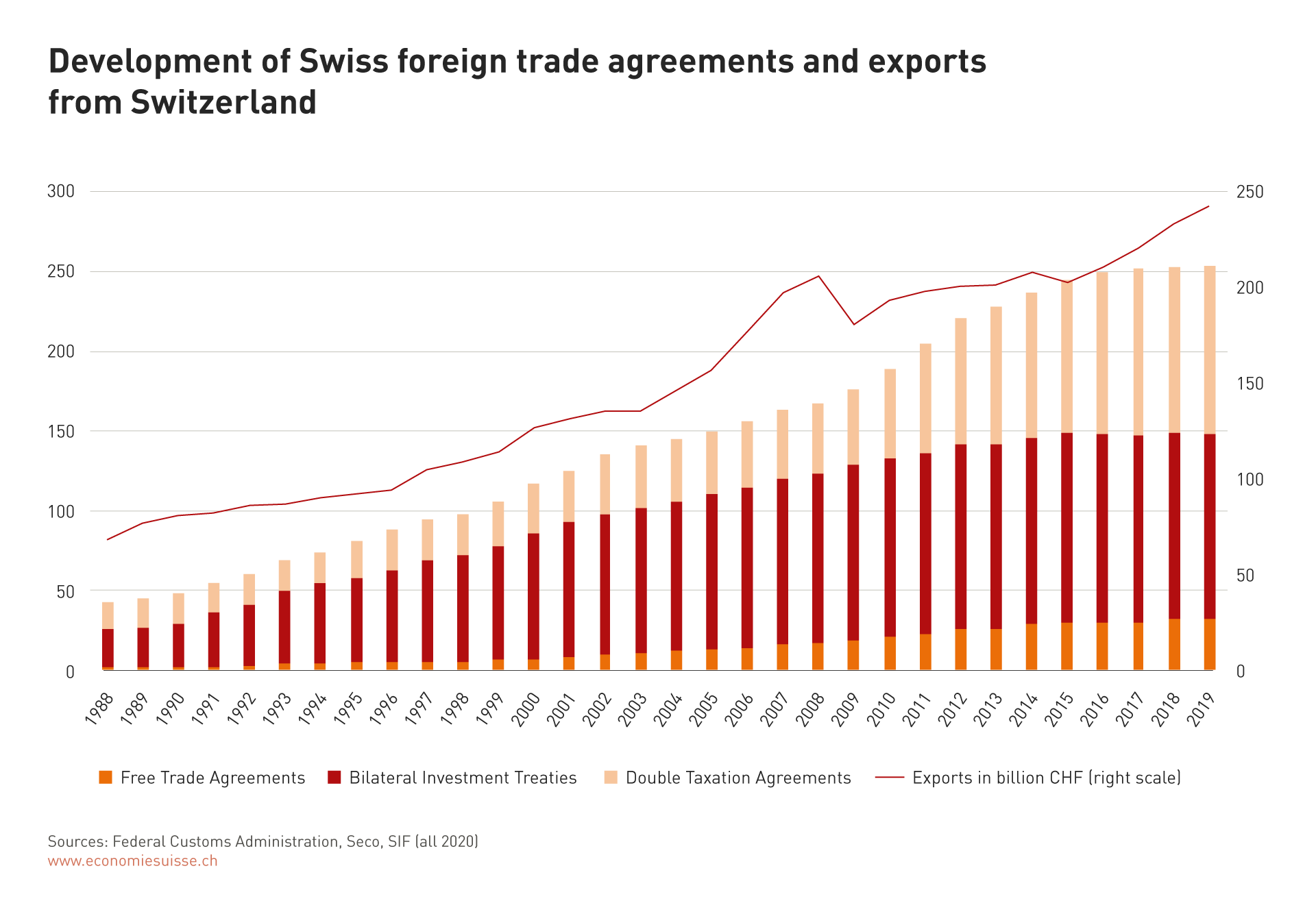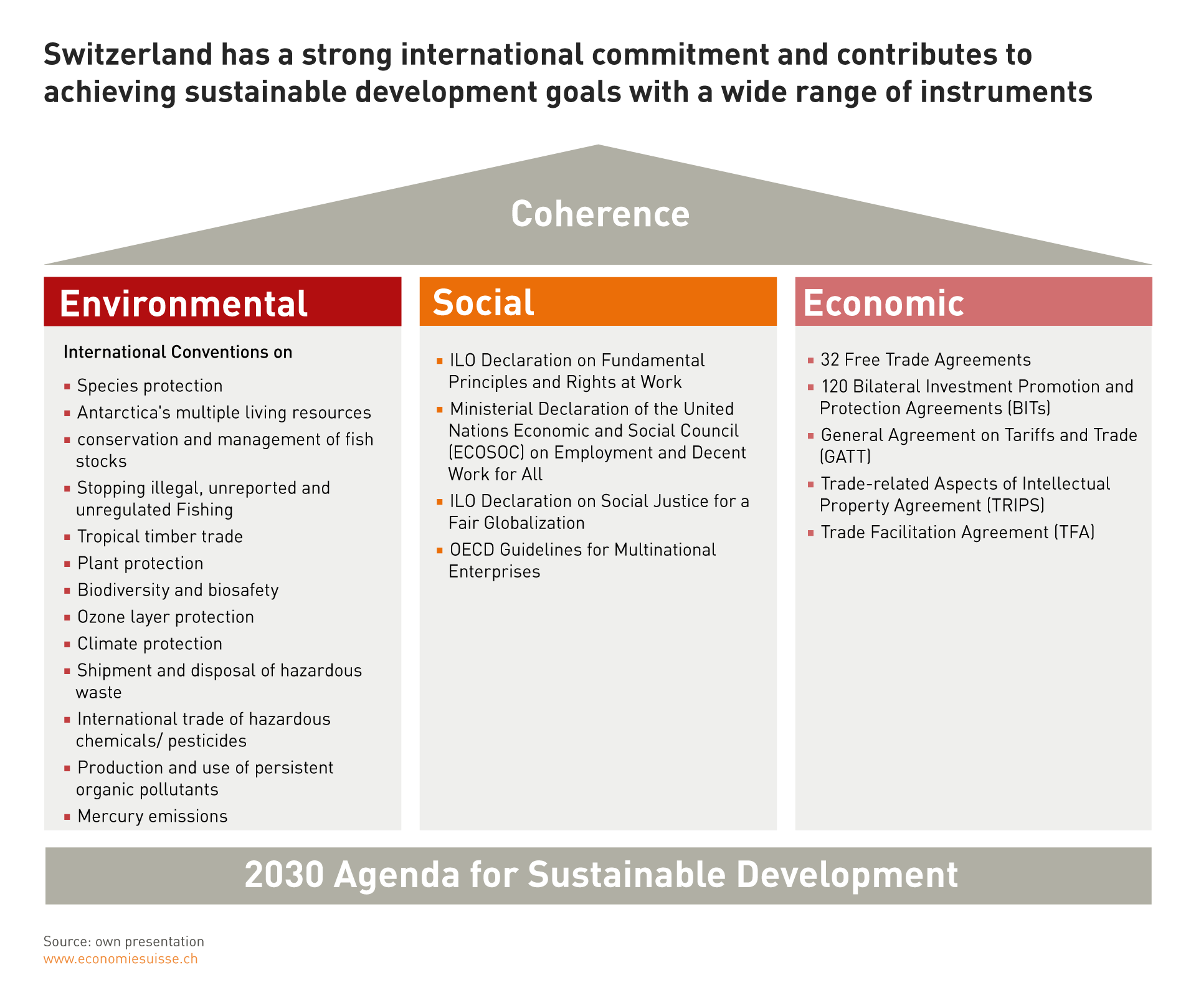Why trade supports rather than hinders sustainable development
- Introduction Executive summary | Positions of economiesuisse
- Chapter 1 Sustainable development includes several dimensions
- Chapter 2 International trade is a prerequisite for sustainable development
- Chapter 3 How Swiss business contributes to sustainable development
- Chapter 4 Effective instruments in the field of sustainability from a Swiss perspective
Effective instruments in the field of sustainability from a Swiss perspective
As part of its foreign policy, Switzerland is committed to greater social, economic and environmental sustainability through a variety of multilateral, plurilateral and bilateral instruments. In this context, the benefits of free trade agreements are first described below and then compared with those of other instruments.
Multilateral reduction of trade barriers as the ideal solution
In view of the positive effects of trade on sustainable development, a generally binding and liberal international trade regime is of central importance. Trade liberalisation is most efficient if it takes place within the framework of the WTO, i.e. multilaterally. In this way, they apply to all WTO members and business can plan worldwide with a single, uniform set of rules. However, due to increasing international trade disputes and protectionist measures, Swiss trade diplomacy is also increasingly focusing on the conclusion of preferential free trade agreements. Currently, Switzerland has 32 such treaties with a total of more than 40 countries. Of these, 29 were negotiated within the framework of the European Free Trade Association (EFTA), of which Switzerland is also a member. These free trade agreements reduce customs duties, which in turn reduces trade costs for Swiss companies and their local customers. They also reduce non-tariff trade barriers, such as different product requirements.
Sustainability chapters in free trade agreements: Cooperation is better than coercion
However, international trade is about much more than just reducing customs duties. Free trade agreements create binding rules so that all partners can benefit from the advantages of trade. Since 2010, for example, every free trade agreement concluded by Switzerland contains a chapter on trade and sustainable development. In this chapter, the signatory states agree to binding provisions on environmental and social aspects in accordance with international conventions. These pursue a cooperative approach, which is why they cannot be enforced through arbitration. This does not mean, however, that these regulations cannot be monitored and enforced. Trade-related sustainability issues are discussed in joint committees. This does not mean that the cooperation approach is ineffective. Evaluations of the provisions on labour standards in trade agreements, for example, show that the cooperation approach is more effective in pursuing social sustainability goals than coercive measures.
A review of the model chapter on trade and sustainable development was undertaken by EFTA in 2019, both in terms of the content of the provisions and the approach to dispute settlement. The new provisions cover issues such as the sustainable management of forest and fisheries resources, biodiversity, climate change, inclusive trade and corporate social responsibility. EFTA also strengthened its approach to dispute settlement with its free trade partners. The new approach allows partners to set up a panel of independent experts if problems cannot be solved through the traditional consultation channel.
Why sustainability impact analyses of Swiss free trade agreements are of little use
Impact analyses of Swiss free trade agreements on the sustainability of countries such as Indonesia – often combined with a short time horizon – are not revealing. In terms of trade in goods, Switzerland’s exports are absolutely fundamental to our economy, but in relation to the market size of certain partner countries they are too small to make causal statements. Our exports of goods to Indonesia, for example, represent only 0.05 percent of the gross domestic product there. Consequently, it cannot be expected that Swiss exports will be significantly reflected in Indonesia’s sustainability indicators, such as CO2 emissions.
Conclusion of investment protection agreements is central
In addition to free trade agreements, Bilateral Investment Treaties (BITs) are central to sustainable development. Switzerland has concluded more than 120 such agreements. These agreements create legal security by protecting investments by Swiss companies in partner countries and by foreign companies in Switzerland against arbitrary expropriation and discrimination. In addition, these agreements regulate the transfer of capital to the home country. The improved framework conditions resulting from this system have been shown to increase the level of foreign direct investment. The greater the legal certainty, the more willing companies are to make long-term investments in another country.
Swiss free trade agreements strengthen economic integration
Free trade agreements demonstrably increase the international exchange of goods. It has been shown that Swiss companies also increased their investments in partner countries significantly after such agreements came into force. Furthermore, exports to these countries have more than doubled in comparison to the overall growth of Swiss exports. The figure below also shows that, as the number of international economic agreements increased, so too did Switzerland's exports.

Switzerland is committed to greater sustainability through various international instruments
Free trade agreements must remain first and foremost economic agreements and minimise trade barriers. They must therefore not be overburdened. The primary objective of a free trade agreement should be to provide Swiss companies with non-discriminatory access to foreign markets. In this way, exports, imports and direct investments enable Swiss companies to make a positive contribution to economic growth and the achievement of SDGs in the target markets.
To make this growth accessible to as many people as possible and to minimise the resulting negative spillover effects, true-cost pricing is an important factor. This means that, in accordance with the polluter pays principle, all costs incurred as a result of actions or omissions are borne by those responsible. At the same time, however, further accompanying measures need to be implemented. These cannot be achieved through bilateral free trade agreements, but with the help of targeted instruments via the relevant multilateral platforms such as the UN, OECD or WTO. Switzerland actively participates in these instruments and the further development of global regulations. It is represented in all important organisations and helps shape standards wherever possible (see figure below). Switzerland incorporates the decisions taken by these bodies in its free trade agreements, thus taking account of its multilateral obligations.

A coherent foreign policy must take this division of responsibilities into account. Free trade agreements must primarily focus on their core function in order to intervene where they have the greatest impact: the removal of international trade barriers. However, in the interests of policy coherence, the concerns of sustainable development should also be considered in free trade agreements. In this respect, Switzerland is not creating new rules, but is instead referring to existing international environmental agreements as well as to the instruments of the International Labour Organization (ILO), for example, in the case of standards for social labour rights abroad. However, the basic standards for sustainable development must continue to be negotiated and developed in the relevant international organisations. This is the only way to ensure that there is a uniform understanding and that the same rules apply in all participating countries. Bilateral free trade agreements are not an effective instrument for further developing rules on labour standards or environmental concerns – after all, no one is asking the International Maritime Organization to dismantle customs duties. If divergent sustainability provisions are laid down in free trade agreements, this weakens the efforts of intergovernmental organisations responsible for developing internationally applicable standards. Nevertheless, free trade agreements reinforce sustainability provisions and contribute to their implementation.





